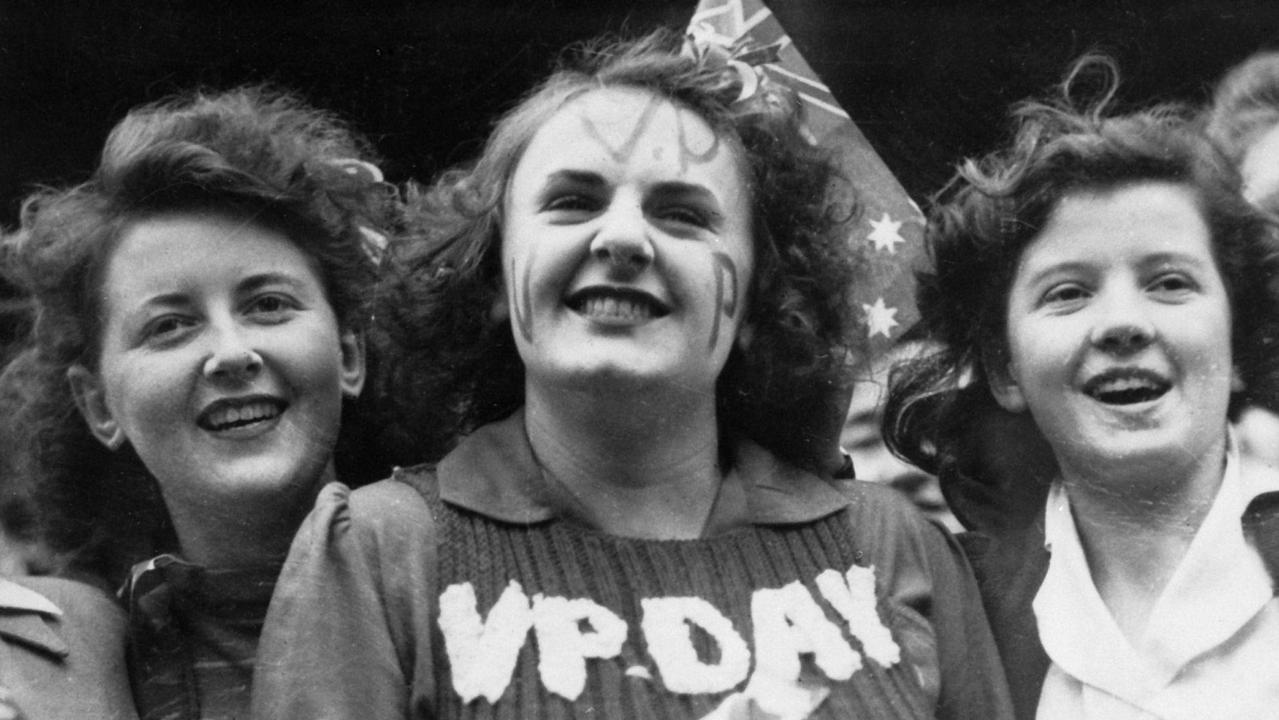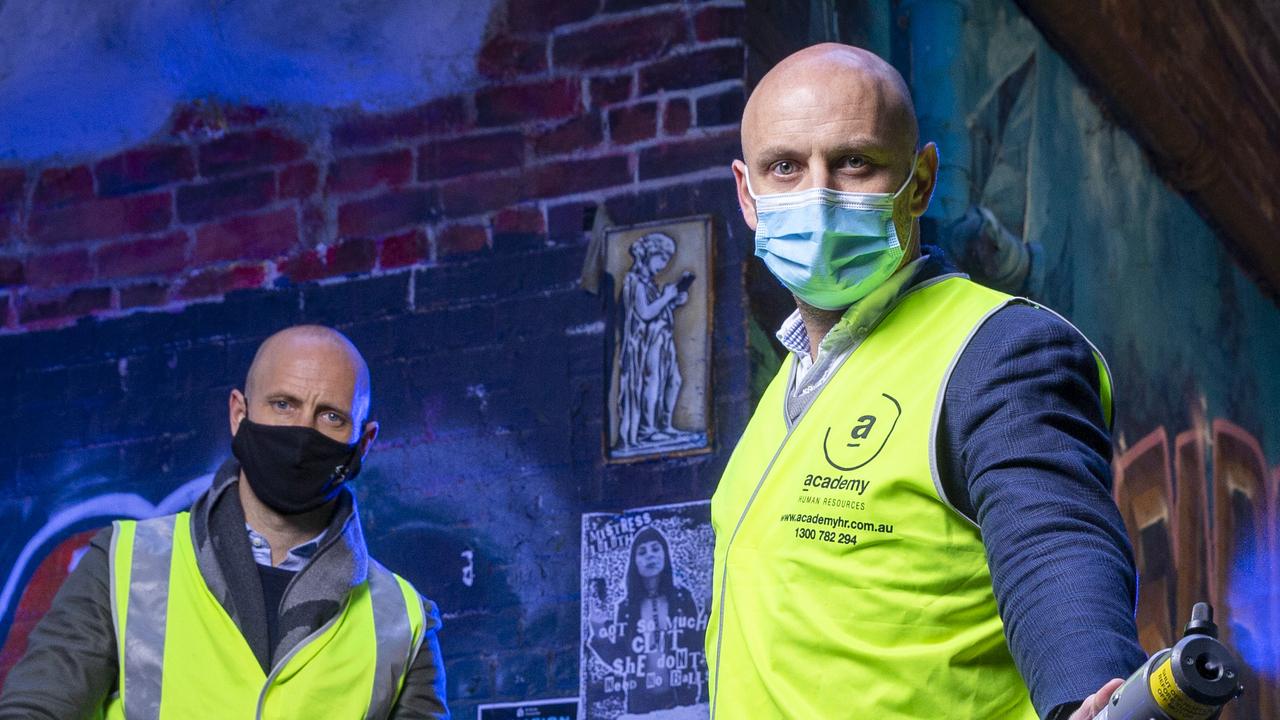Waking up to kid’s sleep: what parents need to know
The growing unhealthy trend of children not getting enough sleep is a huge headache for exhausted parents. But sleep experts — and a national inquiry — are on the case with ways to help rested kids bounce out of bed.
Lifestyle
Don't miss out on the headlines from Lifestyle. Followed categories will be added to My News.
ZZZZZS. The more you chase them, the less likely you’ll catch them. Ask any weary new parent trying to settle a fussy baby. There’s nothing quite as debilitating as that scratchy feeling of exhaustion.
“I was a mess. I questioned myself as a mum and a woman. There’s a reason sleep deprivation is used as torture. It impairs every aspect of your life,” says Yarraville's Jemma O’Connor, mother of Molly, 2½.
“Poor little Molly was up against it right from the start. When most other babies were constantly nodding off, she was this tiny, alert newborn. She had reflux and wanted to be held upright. She never slept more than two-hour stints until she was 11 months old.”
Molly’s sleeplessness continued, adding a huge level of stress to the lives of O’Connor and partner Lance Dodd.
“We’d settle Molly, then ninja roll out of the room and leave her,” O’Connor says.
“On a good night, she might sleep for a couple of hours then wake crying. One of us would then have to zombie shuffle our way back into her room and spend the rest of the night with her.”

It’s not just toddlers — and their parents — suffering. According to the Sleep Health Foundation, more than a third of school-age children may have sleep problems.
“All parents spend a lot of time and energy getting babies into a routine, then somewhere between starting school and the teenage years, it’s kicked out the window,” says Dr Chris Seton, paediatric and adolescent sleep physician at the Woolcock Institute of Medical Research.
“Sleep is no longer regarded as precious.”
What’s behind this wakeful epidemic? How important is sleep anyway? How many hours of shut-eye are recommended? And is there a snooze solution?
Let’s begin with the culprits causing a lack of kip.
The first is busyness. Kids, saddled with before and after-school activities, can be over-scheduled. Often both parents are working and there’s a frantic race home and rush to complete homework, dinner, chores and next-day preparations before the now-wired kids are bundled off to bed.
“Kids are busy bees,” Seton says. “Because sleep is not valued, it’s squeezed out of schedules. It’s then a kind of vicious cycle of pressure to do things. They’re tired, which affects moods, which then leads to poor sleep.”
Engagement with technology also impacts on children’s bedtime routines. We now know the blue light emitted from phones, tablets and other LED-lit devices can scramble sleep patterns because they tell your internal body clock that it’s day time. As well, the stimulation caused by social media, engaging with peers and video games lead to hyper-arousal which also makes falling asleep difficult.
“There is so much FOMO (fear of missing out) and fear of switching off. Sadly, 24-hour connectivity is the new norm,” Seton says.
Slumber also suffers from an image problem — it’s deemed a lazy pursuit. There’s an Australian machismo culture that equates snoozing with wusses, and lack of sleep with success. Margaret Thatcher, Winston Churchill, Barack Obama and Richard Branson are part of a “sleepless elite” and attribute their success to lack of shut-eye. No wonder kids brag they don’t need much time in bed.

“There’s a gap between what society thinks and what science says,” Seton says. “Society believes kids need less sleep as they grow older. Science says children aged 11 to 18 need nine-and-a-bit hours a night. We anonymously surveyed 12,000 kids recently, and only 7 per cent were receiving that amount of sleep.”
More on recommendations later. But first, what’s the impact of lack of sleep?
Parents know first-hand tired kids are ratty. Sleep deprivation affects behaviour, moods, performance and the ability to learn and concentrate. And Seton says the side effects are even more alarming than that.
“Children who do not get enough sleep tend to make poor food choices, eat bad food and are more likely to be obese,” he says.
“Cyber bullying increases. Ethical judgment and sense of humour are impacted. In girls,
self-esteem and body image are affected. In boys, aggressiveness increases (and) they are more likely to indulge in risky behaviour like consuming drugs and alcohol and driving cars fast.”
Frightening news for any parent. So, what is the magic number when it comes to sleep needed?
According to the Raising Children Network:
- Toddlers need about 12-13 hours of sleep in 24 hours. That’s usually 10-12 hours at night and 1-2 hours during the day.
- Five to 8-year-olds need 10-11 hours sleep a night. They’re usually tired after school and might look forward to bedtime from about 7.30pm.
- Nine to 11 years need about 9-11 hours sleep a night.
- Teenagers need 8-10 hours of sleep each night. This means teenagers still need more sleep than adults to be at their best during the day.
However, sleep experts are reluctant to focus on specific hours as this can create anxiety around bedtime, and every child has individual needs. Instead, Seton recommends keeping an eye out for red flags.
“If you regularly need to wake a child up on school mornings, or they sleep in on weekends, that means they are sleep-deprived.”
Associate Professor Margot Davey, director of the Melbourne Children’s Sleep Centre at Monash Children’s Hospital, agrees children’s behaviour is a good indicator of sleep deprivation.
“They should be able to wake themselves in the morning. If you have to wake your primary school children, and they are sleepy during the day, they are probably not sleeping enough.

When children aren’t sleeping, parents aren’t sleeping and the whole family is in disarray,” says Davey, who runs outpatient clinics and overnight sleep studies for children suffering from sleep disorders.
“Each family is individual with different requirements, stressors, care givers and routines. We make sure there is nothing physical going on like breathing difficulties.
We assess the mental health of the child because anxiety and depression can play into sleep problems,” Davey says.
What are some techniques parents can try at home?
First, develop a predictable routine in the lead up to bed, such as shower/bath, brush teeth, quiet read, cuddle and lights out. This cues the brain and separates awake and hyped-up activities from more relaxed ones. Children are creatures of habit so going to bed and waking at similar times are important.
“This wind-down window is what sets up children for a good night’s sleep but it is often missed,” Davey says.
“Parents stare at the clock, have a figure in mind and want everything done and dusted by 8pm. Daytime routine is important, too. Spending time outside, being active, considering meals, making sure they are regular. If you’re sitting on your screens all day, that’s not going to help you at night.”
Seton, who is also an advocate of bedtime routines, says make bed for sleep, not the hub of your child’s life. “It’s called conditional arousal. A lot of kids do everything on the bed — they eat, socialise and play electronics on it. So over time in vulnerable kids, the brain becomes conditioned to being awake,” Seton says.
The bedroom should be environmentally conducive to sleep — dark, quiet and cool.
Parents can also help with the management of kids’ busy lives. This includes ensuring homework is completed, bags are packed, forms are filled and lunch is made.
“If school kids are disorganised, it delays bedtime. I find boys in particular are hopeless time managers in the evening,” Seton says.
Finally, all experts recommend a technology curfew and to treat devices like TV and don’t take them into the bedroom. They are sleep stealers. Adults are also guilty of losing precious hours at night after falling down an internet black hole.
Now the Federal Government’s woken up to the importance of sleep, too. It’s the first government in the world to put slumber on the agenda, conducting an inquiry into Sleep Health Awareness in Australia.

The inquiry considered the prevalence, causes and symptoms of inadequate sleep, as well as the treatment and support available for individuals with sleep disorders.
The aim is to treat sleep as the third pillar of health, alongside nutrition and exercise.
Dr Peter Eastwood is president of the Australasian Sleep Association and professor at the Centre for Sleep Science at the University of WA.
He’s highlighted two recommendations from the inquiry: support for a behavioural change campaign for the whole Australian community around the importance of sleep in children’s lives, and support for an education campaign involving those working in primary care, including GPs, nurses, pharmacists, dentists and psychologists.
“If the community becomes more aware of the problems of inadequate sleep, they need to be able to speak to individuals in primary care,” Eastwood says.
“Yet many primary-care experts have had minimal sleep training to date. For example, teachers need to educate children, identify those who are having poor sleep and work with them and their parents to come up with solutions. I know teachers already do a great deal, but they’re the front line in child behaviour and the first thing that goes in children who are having inadequate sleep is behaviour.”
O’Connor says she’s tried everything to lead her little girl Molly to the land of nod, from self-help books to self-settling, sleep schools to strict routines. Only recently has she devised a schedule that works for them.
“Molly has a double bed, and one of us lies in with her and puts her to sleep. She will only sleep if someone is holding her,” O’Connor says.
She’s conscious co-sleeping is heavily criticised, but for now, she says it’s the answer for this family, especially with a second child due next month.
“I just want to have a nice time with our baby,” O’Connor says. “This is the way the most people in the house achieve the most sleep. It’s not ideal but it’s what works and what we have settled on as family. We are better rested, happier, don’t snipe at each other, no one is crying.
“It feels like I am finally coming out of the trenches.”
FOR MORE INFORMATION VISIT:
HOW TO HELP KIDS SLEEP BETTER
■ Set up a bedtime routine. A routine of bath, story and bed can help younger children feel ready for sleep. For older children,this might include a quiet chat with you about the day, then some time alone relaxing before lights out.
■ Relax before bedtime. Older children might like to wind down by reading a book, listening to gentle music or practising breathingfor relaxation.
■ Keep regular sleep and wake times within 1-2 hours of each other each day to help keep your child’s body clock in a regularpattern. It’s a good idea for weekends and holidays, as well as school days.
■ Make sure your child feels safe at night and isn’t scared about going to bed or being in the dark. Avoid scary TV shows, moviesand computer games. Consider a night light.
■ Avoid the clock. If your child is often checking the time, encourage them to move their clock or watch to where they can’tsee it.
■ Eat the right amount at the right time. Make sure your child has a satisfying evening meal at a reasonable time. Feeling hungryor too full before bed can make your child more alert or uncomfortable.
■ Avoid caffeine, which is found in energy drinks, chocolate and cola.
Source: raisingchildren.net.au


